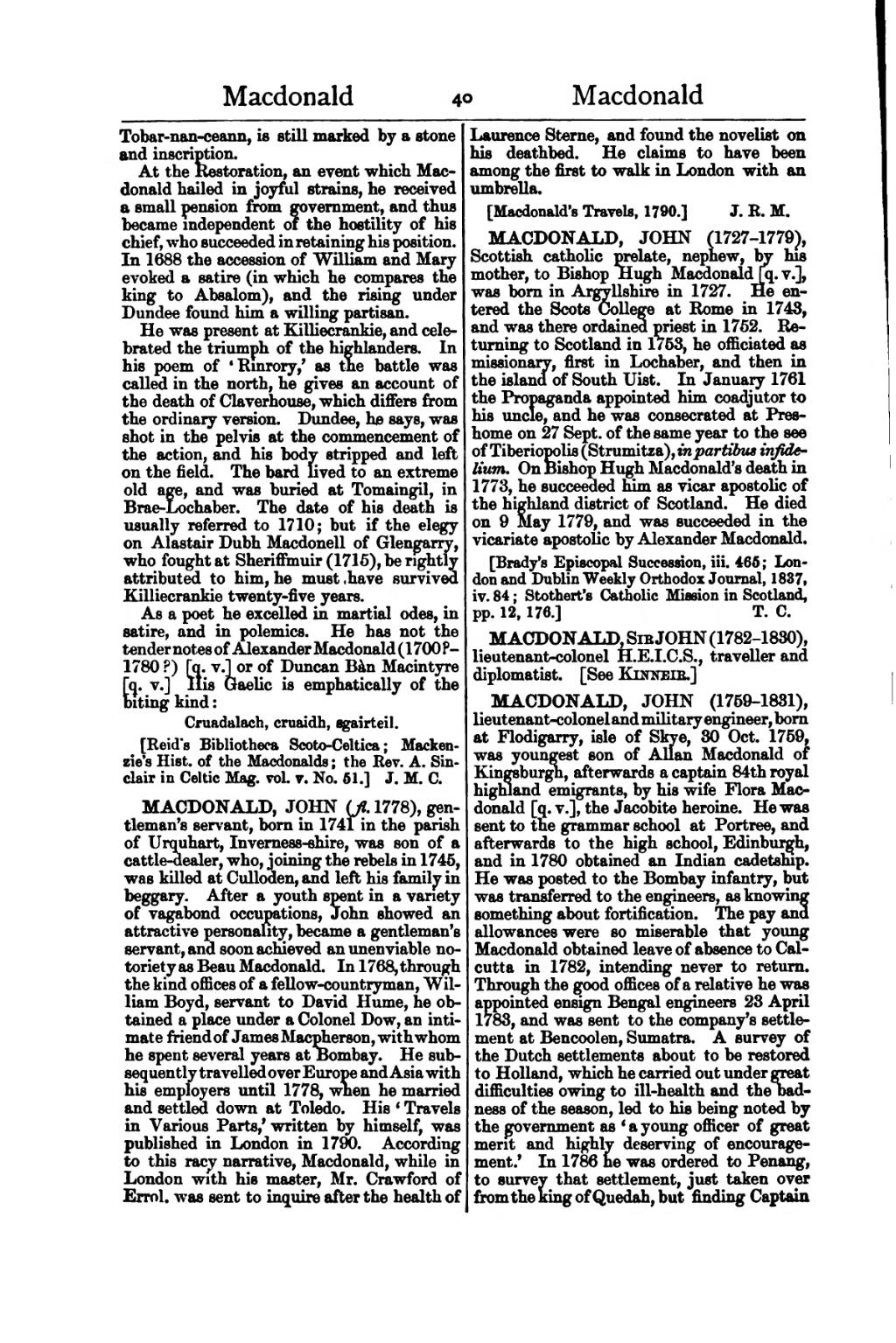Tobar-nan-ceann, is still marked by a stone and inscription.
At the Restoration, an event which Macdonald hailed in joyful strains, he received a small pension from government, and thus became independent of the hostility of his chief, who succeeded in retaining his position. In 1688 the accession of William and Mary evoked a satire (in which he compares the king to Absalom), and the rising under Dundee found him a willing partisan.
He was present at Killiecrankie, and celebrated the triumph of the highlanders. In his poem of ‘Rinrory,’ as the battle was called in the north, he gives an account of the death of Claverhouse, which differs from the ordinary version. Dundee, he says, was shot in the pelvis at the commencement of the action, and his body stripped and left on the field. The bard lived to an extreme old age, and was buried at Tomaingil, in Brae-Lochaber. The date of his death is usually referred to 1710; but if the elegy on Alastair Dubh Macdonell of Glengarry, who fought at Sheriffmuir (1715), be rightly attributed to him, he must have survived Killiecrankie twenty-five years.
As a poet he excelled in martial odes, in satire, and in polemics. He has not the tender notes of Alexander Macdonald (1700?–1780?) [q.v.] or of Duncan Bàn Macintyre [q. v.] His Gaelic is emphatically of the biting kind:
Cruadalach, cruaidh, sgairteil.
[Reid's Bibliotheca Scoto-Celtica; Mackenzie's Hist. of the Macdonalds; the Rev. A. Sinclair in Celtic Mag. vol. v. No. 51.]
MACDONALD, JOHN (fl. 1778), gentleman's servant, born in 1741 in the parish of Urquhart, Inverness-shire, was son of a cattle-dealer, who, joining the rebels in 1745, was killed at Culloden, and left his family in beggary. After a youth spent in a variety of vagabond occupations, John showed an attractive personality, became a gentleman's servant, and soon achieved an unenviable notoriety as Beau Macdonald. In 1768, through the kind offices of a fellow-countryman, William Boyd, servant to David Hume, he obtained a place under a Colonel Dow, an mate friend of James Macpherson, with whom he spent several years at Bombay. He subsequently travelled over Europe and Asia with his employers until 177S, whom he married and settled down at Toledo. His 'Travels in Various Parts,' written by himself, published in London in 1790. According to this racy narrative, Macdonald, while in London with his master, Mr. Crawford of Errol. was sent to inquire after the health of Laurence Sterne, and found the novelist on his deathbed. He claims to have been among the first to walk in London with an umbrella.
[Macdonald's Travels, 1780.]
MACDONALD, JOHN (1727–1779), Scottish catholic prelate, nephew, by his mother, to Bishop Hugh Macdonald [q. v.], was born in Argyllshire in 1727. He entered the Scots College at Rome in 1743, and was there ordained priest in 1752. Returning to Scotland in 1753, he officiated as missionary, first in Lochaber, and then in the island of South Uist. In January 1761 the Propaganda appointed him coadjutor to his uncle, and he was consecrated at Preshome on 27 Sept. of the same year to the see of Tiberiopolis (Strumitza), in partibus infidelium. On Bishop Hugh Macdonald's death in 1773, he succeeded him as vicar apostolic of the highland district of Scotland. He died on 9 May 1779, and was succeeded in the vicariate apostolic by Alexander Macdonald.
[Brady's Episcopal Succession, iii. 465; London and Dublin Weekly Orthodox Journal, 1837, iv. 84; Stothert's Catholic Mission in Scotland, pp. 12, 176.]
MACDONALD, Sir JOHN (1782-1830), lieutenant-colonel H.E.I.C.S., traveller and diplomatist. [See Kinneir.]
MACDONALD, JOHN (1759–1831), lieutenant-colonel and military engineer, born at Flodigarry, isle of Skye, 30 Oct. 1759, was youngest son of Allan Macdonald of Kingsburgh, afterwards a captain 84th royal highland emigrants, by his wife Flora Macdonald [q. v.], the Jacobite heroine. He was sent to the grammar school at Fort Portree, and afterwards to the high school, Edinburgh, and in 1780 obtained an Indian cadetship. He was posted to the Bombay infantry, but was transferred to the engineers, as knowing something about fortification. The pay and allowances were so miserable that young Macdonald obtained leave of absence to Calcutta in 1782, intending never to return. Through the good offices of a relative he was appointed ensign Bengal engineers 23 April 1783, end was sent to the company's settlement at Bencoolen, Sumatra. A survey of the Dutch settlements about to be restored to Holland, which Le carried out under great difficulties owing to ill-health and the badness of the season, led to his being noted by the government as 'a young officer of great merit and highly deserving of encouragement.' In 1786 he was ordered to Penang, to survey that settlement, just taken over from the king of Quedah, but finding Captain
